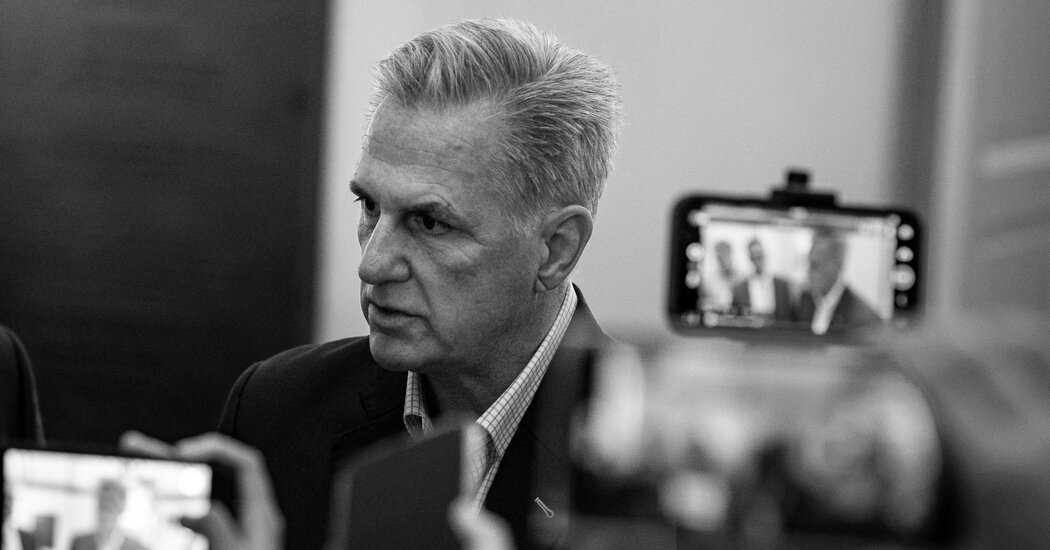The recently struck debt ceiling deal between President Biden and Speaker Kevin McCarthy has the potential to reveal what the Republican Party values and how it operates. It will also shed light on which lines Democrats can hold and which ones they cannot. The agreement is modest with spending cuts and adjustments to the safety net. However, some of the policies are unwise as they involve cutting funding for I.R.S. enforcement and unfairly adding work requirements for some older adults who receive food stamps.
The $69 billion cut in spending for next year and $112 billion for 2025 is a surprise considering the absence of significant budget caps or automatic cuts. The deal leaves intact President Biden’s major achievements such as the Inflation Reduction Act and student loan cancellation.
The potential of threatening to default on the debt when we came very close to it this time in order to close a deal that is quite limited seems like a strange mismatch of ends and means. This agreement raises more questions than providing answers, and here are four of them:
First, is there a deal in place? Following 14 failed votes, ultraconservative House Republicans forced Kevin McCarthy to win the speakership through concessions. After agreeing as part of the deal to allow for any dissatisfied member to call a vote on his speakership at any time, he had to avoid their displeasure. The question is whether a deal between Biden and McCarthy will satisfy not only them but also the Freedom Caucus.
Representative Chip Roy, a prominent member of the Freedom Caucus, tweeted that the $4 trillion debt for a spending freeze of two years was unacceptable and accused McCarthy of breaking promises made during his campaign for speakership. However, McCarthy is not acting as if he needs to please his right flank and may rely on Democratic votes to cover conservative defections. If he survives this play, then his speakership would look stronger and more stable than its troubled birth suggested.
Today’s Republican Party has a different view of fiscal policies compared to what it once had. While the 2011 debt ceiling crisis resolved with a trillion-dollar cut over ten years, a supercommittee, and backup mechanism that would hammer down more than a trillion dollars in automatic cuts if the committee did not reach an agreement, the current Republican Party has declared Social Security, Medicare, and military spending as sacrosanct. Instead of cutting important expenditures, they propose cuts to nondefense discretionary spending, which accounts for only a sixth of the annual federal spending.
When will Democrats address the debt ceiling issue? In contrast to the past, Biden appeared different when he swore he would never engage in negotiations over the debt ceiling, only to do so recently. This deal includes Republican policy demands, but there was no attempt by the Democrats to find a bipartisan deal that would achieve major administration aims. This experience proves that as long as the debt ceiling exists, there is no way to negotiate around it. The “premium bonds,” the 14th Amendment, or the multitrillion-dollar platinum coin, all have too much legal and market risk. To get rid of the debt ceiling, the Democrats should eliminate it when they next have the chance.
Are bipartisan debt deals dead? Some argue that the debt ceiling, as a forcing mechanism for bipartisan debt deals, does more good than harm. However, Republicans view raising the debt ceiling as the primary concession they are offering Democrats. Therefore, they have no incentive to bargain over a balanced policy package, as Democratic priorities, like tax increases, will be part of the deal. In general, Democrats want to break the Republican habit of using the debt ceiling as leverage. Biden can sell this deal to his party only because the concessions are minimal. Otherwise, the deal would be seen by Democrats as catastrophic precedent and bad policy.
The 2010 debt debates are a good comparison to today’s situation. The big bipartisan debt deal that many sought never materialized. The effective way to move the budget forward is to find a Republican Party willing to negotiate a bill that accepts tax increases and bolsters Biden in 2024. However, this does not appear to be the current Republican Party’s agenda. While deficits are not a significant concern and should take a backseat to other pressing matters such as climate change, A.I., and conflict, it is a reasonable time to put the budget on a sounder path. The Congressional Budget Office projects that the interest payments on the national debt will grow to 7.2% of G.D.P. in 2052.
In conclusion, while this debt ceiling deal may seem minimal, it can reveal much about the Republican Party’s goals and will show the limits of Democratic holdouts. Getting rid of the debt ceiling altogether is the only way to move forward without being hampered by partisan squabbles and the lack of a balanced policy.














